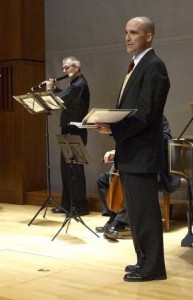
Yes, there was Bach, but there were others, too
The Miami Bach Society’s Tropical Baroque Festival, now in its 12th incarnation, continues through this weekend with concerts featuring Fuoco e Cenere (Fire and Ash), the French-based early music ensemble with the Italian name, founded by a guy from New York.
Their two appearances Friday and Saturday (followed by another Sunday afternoon up north in Delray Beach) come in the wake of the Tropical Baroque Festival debut Thursday night of Arcanum, the Baroque group founded last year by singer Tony Boutte and flutist Colin St. Martin.
I’m sorry I didn’t get a chance to make it to Arcanum’s concert, because it looked like a good one. Called Bist du bei Bach? it’s a survey of the music from J.S. Bach’s time that wasn’t by the master of St. Thomas. The title of the concert is a play on Bist du bei mir, the aria long attributed to Bach that has since been discovered to be from an opera called Diomedes, by Gottfried Heinrich Stölzel (1690-1749).
I would imagine that aria was on the program Thursday night, because according to the group, the survival of a relatively high percentage of Bach’s music has much to do with the composer’s popularity over the last century. “How much more lauded and performed would [Johann Friedrich] Fasch, [Christian Ferdinand] Abel, [Georg Melchior] Hoffmann, Stölzel and [Silvius Leopld] Weiss be today, had a larger amount of their music been preserved or properly attributed?”
This is a reasonable question, and sheds light on the dicey music-publishing situation in the early 18th century; one of the reasons for the wide dissemination of Handel’s work in his own day was that he joined forces with the pioneering English publisher John Walsh. (It also reminds me of the argument advanced by the musicologist Tia DeNora that one reason for the popularity of Beethoven is that he got better press than everyone else, squeezing out his competitors.)
Arcanum doesn’t seem to want to take anything away from Bach, just let us in on some of the other fine music being written during his time. And that’s laudable: History is a great discipline, but one of the toughest tasks it faces is reconstructing the contemporary milieu of a long-past time. We know from Robert Musil, for instance, that Europe just before World War I trembled on the brink of eruption, but we can’t really feel it, because the assumptions people made at that time were steeped in an earlier period whose flavor is impossible to resurrect.
And the same goes for the music around the great figures. If we listen to Michael Haydn, Pergolesi and J.C. Bach in particular, we can hear how they influenced the music of Mozart, who ultimately outranked them all. Listen, for instance, to the opening of the Michael Haydn Requiem, written before Mozart’s, and see what you think.
But it doesn’t mean that their music isn’t worth hearing, and groups like Arcanum have the advantage of more resources made available through digital storage, and in their case, a relatively open market in South Florida to establish a Baroque beachhead. So it may be that we’ll hear more of Weiss and Hoffmann in the years ahead, and hold them in the same affection, or at least close, that we do the music of Bach.
It could happen, and at the very least, we’ll hear some fine music that for too long has gone without an audience.
Recent Content
-
Artsarticle ·
-
Artsarticle ·
-
Artsarticle ·
